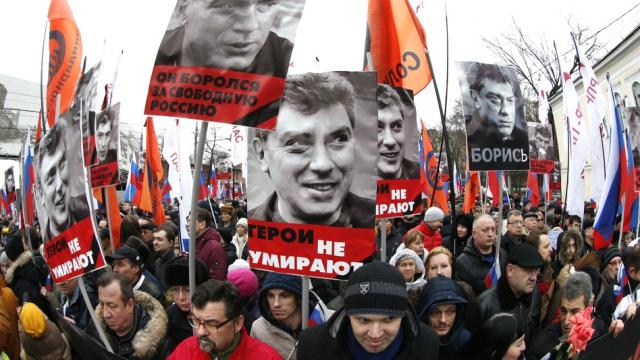
Holding placards declaring "I am not afraid," thousands of Russians marched in Moscow on Sunday in memory of Kremlin critic Boris Nemtsov, whose slaying on the streets of the capital has shaken Russia's beleaguered opposition.
One organizer said that more than 70,000 people turned out in central Moscow on Sunday, many carrying Russian flags and slowly marching through an avenue alongside the River Moskva. Police estimated the crowd at more than 16,000.
Russian investigators say they are pursuing several lines of inquiry, including the possibility that Nemtsov, 55, was killed by Muslim attackers or that the opposition killed him to blacken the president's name.
Putin's opponents say such suggestions show the cynicism of Russia's leaders as they whip up nationalism, hatred and anti-Western hysteria to rally support for his policies on Ukraine and deflect blame for an economic crisis.
"It is a blow to Russia. If political views are punished this way, then this country simply has no future," Sergei Mitrokhin, an opposition leader, said of Nemtsov's murder.
Putin has described the killing as a "provocation," and told Nemtsov's 86-year-old mother, Dina Eidman, that the killers would be found and punished.
He also promised to do everything possible to bring to justice those responsible for Nemtsov's killing.
"Everything will be done so that the organizers and perpetrators of a vile and cynical murder get the punishment they deserve," Putin said in a telegram to Nemtsov's mother published on the Kremlin's website.
He said Nemtsov's death was an irreparable loss and that he had "left his trace in Russia's history, in politics and public life".
Nemtsov was one of the leading lights of an opposition struggling to revive its fortunes three years after mass rallies against Putin failed to prevent him from returning to the presidency after four years as prime minister.
Putin has been Russia's dominant leader since 2000, when ailing President Boris Yeltsin chose the former KGB spy as his successor, a role Nemtsov had once been destined to play.
*
MEANWHILE, Deutsche Welle reports:
Western media carried translated excerpts from Nemtsov's last radio interview aired by the station Echo Moskwy, just three hours before he was shot dead on a Moscow bridge near the Kremlin close to midnight while walking home.
His female companion, a Ukrainian, survived.
During Friday's interview, Nemtsov, once a deputy premier under former president Boris Yeltsin, said the presence of Russian troops in the Donbass region of eastern Ukraine was "proven" – a claim denied by the Kremlin.
Putin on Saturday in a telegraph to Nemtsov's elderly mother said he would bring the perpetrators of the "vile and cynical murder" to justice. Russia's federal investigative agency has said it is looking into several possible motives.
Russian television has aired distant video camera footage showing the suspected gunman jumping into a waiting car which then sped off. Reports suggest that at least four shots were fired at the most prominent politician to have been assassinated in post-Soviet Russia.
Putin's Ukraine Stance Slammed
In his interview, Nemtsov said: "The most important reason for the crisis is that Putin began a senselessly aggressive, and for our country and for many civilians, a deadly policy of war against Ukraine."
"To bring Russia into order and to overcome the crisis real political reforms are necessary," Nemtsov said.
Needed were honest elections without hindrance of Russia's opposition, he added.
"The censure must be ended, to stop the wretched untruthful propaganda that has warped the reasoning of the Russian population," he told Echo Moskwy.
The 55-year-old liberal went on to call for anti-corruption laws, less military spending and investment in Russia's education sector, and called for Putin's resignation.
Funeral March
Nemtsov had given the interview to urge people to joint a Sunday opposition rally in Moscow to demand an end to Putin's Ukraine policy.
Instead, Moscow authorities gave approval for mourners to attend a funeral march to the bridge where he was gunned down.
Prominent opposition commentator Yulia Latynina said on radio that Russia had entered a "new epoch – the epoch of the physical liquidation of political opponents on the regime."
"The message is absolutely clear: anyone who attends an opposition march can be killed. This is an act of political terror," she said.
She was contradicted by Kremlin spokesman Dmitry Peskow, who said it was "too emotional and wrong to conclude that a string of such murders had begun."
Another opposition leader, Alexei Navalny, who is serving a short jail term for handing out leaflets, called on authorities to allow him to attend the farewell event for his ally.
Former government head turned opposition figure Michail Kasyanov described the murder as a "monstrous tragedy," saying aggression had grown.
"What has become of Russia?," he asked on Echo Moskwy. "In the 21st century, a leader of the opposition is being demonstratively shot just outside the walls of the Kremlin!"
Nemtsov's death is the latest in a string of murders of opposition figures during Putin's 15 years in power. Anti-Kremlin reporter Anna Politkovskaya was gunned down in 2006.
During the weekend, Russian state television broadcast funeral music and pictures of Nemtsov's life. He was once seen as a possible successor to Boris Yeltsin, Russia's first elected president.
Anti-Western Protest
The previous weekend, tens of thousands of Kremlin supporters, including radical bikers and former soldiers, were mobilized to demonstrate in central Moscow. They vowed to protect Putin from "Russia's enemies" and vowed that last year's pro-Western protests in the Ukrainian capital Kyiv would never be repeated in Russia.
In another interview, last month with the Sobesednik newspaper, Nemtsov said his 86-year old mother was afraid that he would be killed, allegedly by Putin.
Asked if he had such fears himself, he responded: "If I were afraid I wouldn't have led an opposition party."
3 WAYS TO SHOW YOUR SUPPORT
- Log in to post comments















